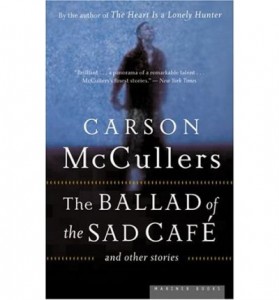--The blurb--
"In The Ballad Of The Sad Café, a tale of unrequited love, Miss Amelia, a spirited, unconventional woman, runs a small-town store and, except for a marriage that lasted just ten days, has always lived alone. Then Cousin Lymon appears from nowhere, a little, strutting hunchback who steals Miss Amelia's heart.Together they transform the store into a lively, popular café. But when her rejected husband Marvin Macy returns, the result is a bizarre love triangle that brings with it violence, hatred and betrayal. Six other stories by Carson McCullers also appear in this volume."
--The review--
Having grown up with the Eighties classic songs "Follow You Anywhere" and "Every Day Hurts", by a group called Sad Café, I was mainly intrigued by this short story once I'd learned that the band had taken it's name's inspiration from it. I was even more intrigued to find that the author had kicked off her writing career when she was only nineteen, publishing the short story "Wunderkind" (which is also included in this volume). It is for "The Ballad of the Sad Café", though, for which she is best-known.
At times it is tough to see why, with some characters seeming underdeveloped and Amelia's tolerance and affection for Cousin Lymon apparently incomprehensible or deliberately kept from the reader. However, it is the overriding theme of melancholy which serves to draw the reader in and keep them there, with the sad image of an abandoned town that was once filled with fun and community.
There are also inconsistencies: for a protagonist who is supposed to be mean and miserly in every respect, making money out of every possible avenue, it seems improbable that she would charge "no fees whatsoever" for her medical services.
But the greatest appeal - aside from the persistently haunting atmosphere (even if McCullers is outdone by Henry James or Wilkie Collins in this respect) and unique cast of characters - lies in the sheer beauty of some of the author's insights, which will tug at the heartstrings of any reader who sees themselves as being similarly affected by the experience of unrequited love ("he must house his love within himself as best he can: he must create for himself a whole new inward world - a world intense and strange, complete in itself") or the feeling that life has not turned out as expected ("Often after you have sweated and tried and things are not better for you, there comes a feeling deep down in the soul that you are not worth much"). Such extracts can be viewed as epitomising the very purpose of literature: to portray the experiences of others to those who have not experienced them, or to allow others who have experienced them to know that there is someone out there who has been through it too.
The other stories in this collection - The Jockey, Mme Zilensky and the King of Finland, The Sojourner, A Domestic Dilemma, and A Tree, A Rock, A Cloud - are more forgettable and it is not always clear what point McCullers is trying to make. The Sojourner and A Domestic Dilemma are perhaps the most moving; as well as encapsulating McCullers' trademark pensive style, one features a man trapped by his past and the other stars a man trapped by his present. Like The Ballad of the Sad Café, it is strikingly relevant to modern life, proving that the feelings experienced by people are the things that are truly timeless.
Other works by Carson McCullers
The Heart is a Lonely Hunter (1940)
Reflections in a Golden Eye (1941)
The Member of the Wedding (1946)
The Square Root of Wonderful (1958; play)
Clock Without Hands (1961)
Sweet as a Pickle and Clean as a Pig (1964; poems)






No comments:
Post a Comment